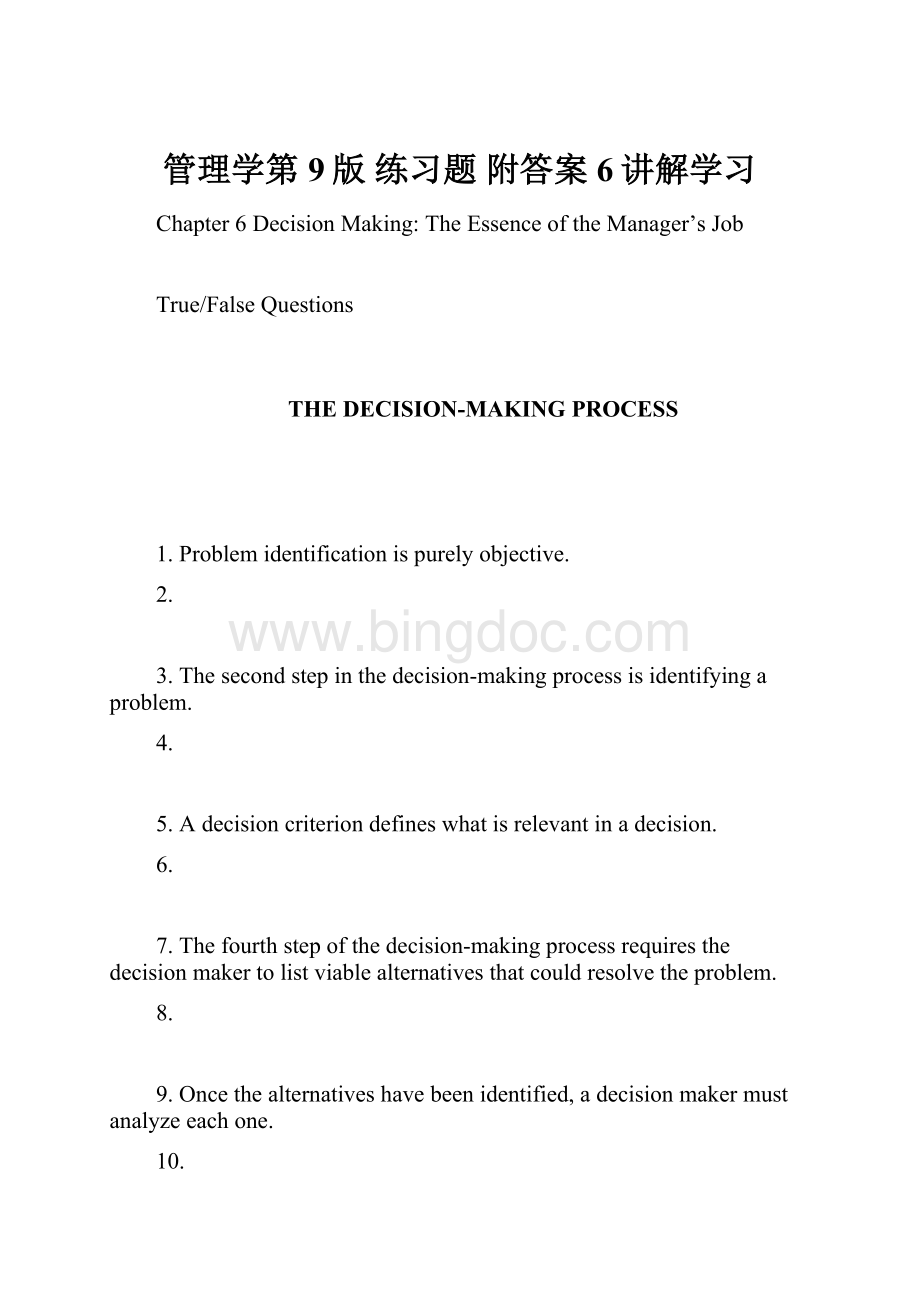管理学第9版 练习题 附答案 6讲解学习.docx
《管理学第9版 练习题 附答案 6讲解学习.docx》由会员分享,可在线阅读,更多相关《管理学第9版 练习题 附答案 6讲解学习.docx(66页珍藏版)》请在冰点文库上搜索。

管理学第9版练习题附答案6讲解学习
Chapter6DecisionMaking:
TheEssenceoftheManager’sJob
True/FalseQuestions
THEDECISION-MAKINGPROCESS
1.Problemidentificationispurelyobjective.
2.
3.Thesecondstepinthedecision-makingprocessisidentifyingaproblem.
4.
5.Adecisioncriteriondefineswhatisrelevantinadecision.
6.
7.Thefourthstepofthedecision-makingprocessrequiresthedecisionmakertolistviablealternativesthatcouldresolvetheproblem.
8.
9.Oncethealternativeshavebeenidentified,adecisionmakermustanalyzeeachone.
10.
11.Thestepinthedecision-makingprocessthatinvolveschoosingabestalternativeistermedimplementation.
12.
THEMANAGERASDECISIONMAKER
13.Makingdecisionsiswiththeessenceofmanagement.
14.
15.Managerialdecisionmakingisassumedtoberational.
16.
17.Oneassumptionofrationalityisthatwecannotknowallofthealternatives.
18.
19.Managerstendtooperateunderassumptionsofboundedrationality.
20.
21.StudiesoftheeventsleadinguptotheChallengerspaceshuttledisasterpointtoanescalationofcommitmentbydecisionmakers.
22.
23.Managersregularlyusetheirintuitionindecisionmaking.
24.
25.Rationalanalysisandintuitivedecisionmakingarecomplementary.
26.
27.Programmeddecisionstendtoberepetitiveandroutine.
28.
29.Rulesandpoliciesarebasicallythesame.
30.
31.Apolicyisanexplicitstatementthattellsamanagerwhatheorsheoughtoroughtnottodo.
32.
33.Thesolutiontononprogrammeddecisionmakingreliesonprocedures,rules,andpolicies.
34.
35.Mostmanagerialdecisionsintherealworldarefullynonprogrammed.
36.
37.Theidealsituationformakingdecisionsislowrisk.
38.
39.Riskistheconditioninwhichthedecisionmakerisabletoestimatethelikelihoodofcertainoutcomes.
40.
41.Riskisasituationinwhichadecisionmakerhasneithercertaintynorreasonableprobabilityestimates.
42.
43.Peoplewhohavealowtoleranceforambiguityandarerationalintheirwayofthinkingaresaidtohaveadirectivestyle.
44.
45.Decisionmakerswithananalyticstylehaveamuchlowertoleranceforambiguitythandodirectivetypes.
46.
47.Individualswithaconceptualstyletendtobeverybroadintheiroutlookandwilllookatmanyalternatives.
48.
49.Behavioral-styledecisionmakersworkwellwithothers.
50.
51.Mostmanagershavecharacteristicsofanalyticdecisionmakers.
52.
53.Accordingtotheboxedfeature,“ManagingWorkforceDiversity,”diverseemployeestendtomakedecisionsfasterthanahomogeneousgroupofemployees.
54.
55.Theanchoringeffectdescribeswhendecisionmakersfixateoninitialinformationasastartingpointandthen,onceset,theyfailtoadequatelyadjustforsubsequentinformation.
56.
57.Theavailabilitybiasdescribeswhendecisionmakerstrytocreatemeaningoutofrandomevents.
58.
59.Thesunkcosterroriswhendecisionmakersforgetthatcurrentchoicescannotcorrectthepast.
60.
DECISIONMAKINGFORTODAY’SWORLD
61.Today’sbusinessworldrevolvesaroundmakingdecisions,usuallywithcompleteoradequateinformation,andunderminimaltimepressure.62.
63.Managersneedtounderstandculturaldifferencestomakeeffectivedecisionsintoday’sfast-movingworld.
64.
65.Accordingtotheboxedfeature,“FocusonLeadership,”whenidentifyingproblems,managersmightbefromaculturethatisfocusedonproblemsolving,ortheirculturemightbeoneofsituationacceptance.
66.
67.Accordingtotheboxedfeature,“FocusonLeadership,”findingsfromstudiesbyGeertHofstedeandfromGLOBEresearchersshowthatinhighuncertaintyavoidancecountries,decisionmakingtendstobebasedmoreonintuitionthanonformalanalysis.
68.
69.Highlyreliableorganizations(HROs)areeasilytrickedbytheirsuccess.
70.
Multiple-ChoiceQuestions
Foreachofthefollowingchoosetheanswerthatmostcompletelyanswersthequestion.
THEDECISION-MAKINGPROCESS
71.Decisionmakingistypicallydescribedas________________,whichisaviewthatistoosimplistic.
72.
a.decidingwhatiscorrect
b.
c.puttingpreferencesonpaper
d.
e.choosingamongalternatives
f.
g.processinginformationtocompletion
h.
73.Aseriesofeightstepsthatbeginswithidentifyingaproblemandconcludeswithevaluatingthedecision’seffectivenessisthe________________.
74.
a.decision-makingprocess
b.
c.managerialprocess
d.
e.maximinstyle
f.
g.boundedrationalityapproach
h.
75.________________istheexistenceofadiscrepancybetweenanexistingandadesiredstateofaffairs.
76.
a.Anopportunity
b.
c.Asolution
d.
e.Aweakness
f.
g.Aproblem
h.
77.Inidentifyingtheproblem,amanager_________________.
78.
a.comparesthecurrentstateofaffairswithwheretheywouldliketobe
b.
c.expectsproblemstobedefinedbyneonlights
d.
e.looksfordiscrepanciesthatcanbepostponed
f.
g.willnotactwhenthereispressuretomakeadecision
h.
79.Whichofthefollowingstatementsistrueconcerningproblemidentification?
80.
a.Problemsaregenerallyobvious.
b.
c.Asymptomandaproblemarebasicallythesame.
d.
e.Well-trainedmanagersgenerallyagreeonwhatisconsideredaproblem.
f.
g.Theproblemmustbesuchthatitexertssometypeofpressureonthemanagertoact.
h.
81.Whatisthesecondstepinthedecision-makingprocess?
82.
a.identifyingdecisioncriteria
b.
c.allocatingweightstothecriteria
d.
e.analyzingalternatives
f.
g.identifyingaproblem
h.
83.Todeterminethe_____________,amanagermustdeterminewhatisrelevantorimportanttoresolvingtheproblem.
84.
a.geocentricbehaviorneeded
b.
c.numberofallowablealternatives
d.
e.weightingofdecisioncriteria
f.
g.decisioncriteria
h.
85.Whatisthethirdstepinthedecision-makingprocess?
86.
a.allocatingweightstothecriteria
b.
c.analyzingthealternatives
d.
e.selectingthebestalternative
f.
g.implementingthealternative
h.
87.Ifallcriteriainthedecisionmakingareequal,weightingthecriteria______________.
88.
a.improvesdecisionmakingwhenlargenumbersofcriteriaareinvolved
b.
c.isnotneeded
d.
e.producesexcellentdecisions
f.
g.improvesthecriteria
h.
89.Inallocatingweightstothedecisioncriteria,whichofthefollowingishelpfultoremember?
90.
a.Allweightsmustbethesame.
b.
c.Thetotaloftheweightsshouldsumto1.0.
d.
e.Everyfactorcriterionconsidered,regardlessofitsimportance,mustreceivesomeweighting.
f.
g.Assignthemostimportantcriterionascore,andthenassignweightsagainstthatstandard.
h.
91.Whatisthestepwhereadecisionmakerwantstobecreativeincomingupwithpossiblealternative?
92.
a.allocatingweightstothecriteria
b.
c.analyzingalternatives
d.
e.developingalternatives
f.
g.identifyingdecisioncriteria
h.
93.Whenanalyzingalternatives,whatbecomesevident?
94.
a.thestrengthsandweaknessesofeachalternative
b.
c.theweightingofalternatives
d.
e.thelistofalternatives
f.
g.theproblem
h.
95.Whendevelopingalternativesinthedecision-makingprocess,whatmustamanagerdo?
96.
a.listalternatives
b.
c.evaluatealternatives
d.
e.weightalternatives
f.
g.implementalternatives
h.
97.Selectinganalternativeinthedecision-makingprocessisaccomplishedby__________________.
98.
a.choosingthealternativewiththehighestscore
b.
c.choosingtheoneyoulikebest
d.
e.selectingthealternativethathasthelowestprice
f.
g.selectingthealternativethatisthemostreliable
h.
99.InStep6ofthedecision-makingprocess,eachalternativeisevaluatedbyappraisingitagainstthe_____________.
100.
a.subjectivegoalsofthedecisionmaker
b.
c.criteria
d.
e.assessedvalues
f.
g.implementationstrategy
h.
101.______________includesconveyingadecisiontothoseaffectedandgettingtheircommitmenttoit.
102.
a.Selectinganalternative
b.
c.Evaluatingthedecisioneffectiveness
d.
e.Implementingthealternatives
f.
g.Analyzingalternatives
h.
103.Whichofthefollowingisimportantineffectivelyimplementingthechosenalternativeinthedecision-makingprocess?
104.
a.gettingupper-managementsupport
b.
c.double-checkingyouranalysisforpotentialerrors
d.
e.allowingthoseimpactedbytheoutcometoparticipateintheprocess
f.
g.ignoringcriticismconcerningyourchosenalternative
h.
105.Thefinalstepinthedecision-makingprocessisto_______________.
106.
a.pickthecriteriaforthenextdecision
b.
c.reevaluatetheweightingsofthecriteriauntiltheyindicatethecorrectoutcome
d.
e.evaluatetheoutcomeofthedecision
f.
g.reassigntheratingsonthecriteriatofinddifferentoutcomes
h.
107.Whichofthefollowingisimportanttorememberinevaluatingtheeffectivenessofthedecision-makingprocess?
108.
a.Youshouldignorecriticismconcerningthedecision-makingprocess.
b.
c.Youmayhavetostartthewholedecisionprocessover.
d.
e.Youwillhavetorestartthedecision-makingprocessifthedecisionislessthan50percenteffective.
f.
g.Ninetypercentofproblemswithdecisionmakingoccurintheimplementationstep.
h.
THEMANAGERASDECISIONMAKER
109.Managersareassumedtobe______________;theymakeconsistent,value-maximizingchoiceswithinspecifiedconstraints.
110.